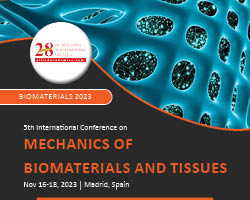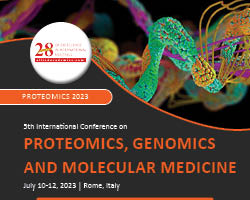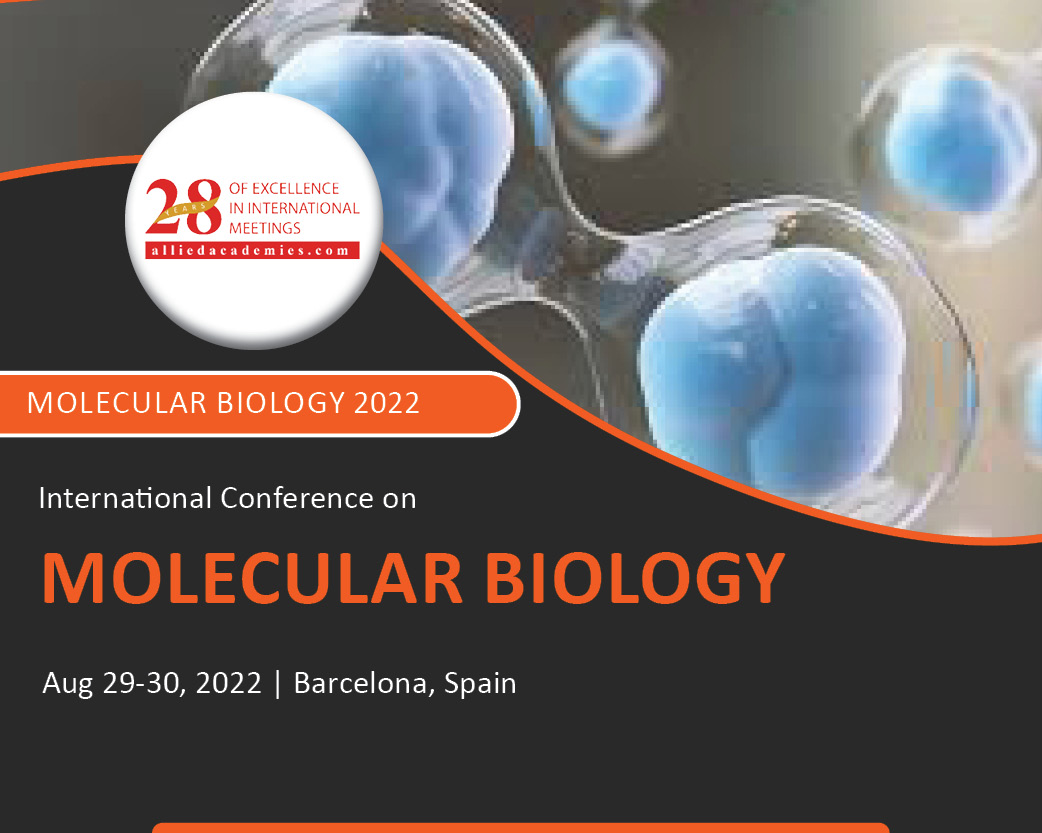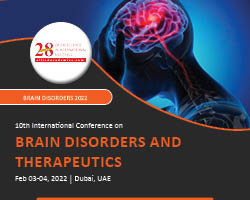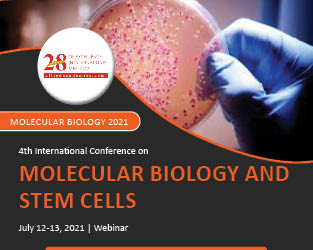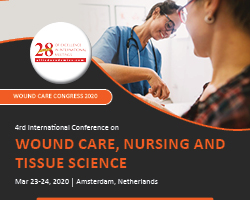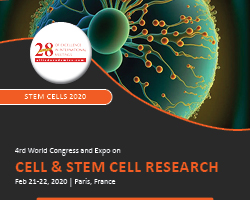2023 Conferences
2022 Conferences
2021 Conferences
2020 Conferences
Genetics is thebranch of science which is associated with the study of genes includingstructural and functional characteristic of genes, behaviour of genes, geneticdistribution, heredity and its variation in different organisms. Molecular Biology dealswith the study of cells at the molecular level; it is related to theunderstanding of structure and composition of various bio molecules that areresponsible for carrying out different biological processes.
Allied Academies have been long hostingdifferent scientific conferences encompassing all the relevant current topicsuseful for the society. Our conferences are dedicated to bring in the mosttalented individuals from the respective field of study to enlighten ourknowledge with the current developments occurring in the world.
Allied Academies organizes 1000+conferences every year all around the globe having participants from every nookand corner of the world.
Ourevents primary moto is to gather the best and the topmost experts, academicians,industrialists, scientists, researchers, professors to bring forth theirsplendid work amongst the worldwide audience. It provides an international platformfor sharing and taking back recent advances from the related field. It’sgolden opportunity to discuss your research with the renowned personalitiesfrom different scientific spheres starting from medicine, agriculture,environment, pharmacy, physics, life science, to chemistry.
Objective of Genetics& Molecular Biology Conferences
Genetics& Molecular Biology conferences deals with wide range of related topicswhich includes genomics, biotechnology, bioinformatics, biochemistry, proteomics, molecularvirology along with the chemistry of nucleic acids and proteins. This is a multi-disciplinary field whichbrings in all the basic molecular and cellular study under one roof.
Molecular Biologyconferences will be having different modes of participation that involvesKeynote talk, Speaker Presentation, Young Research Forum, Poster and E-PosterPresentations, Exhibitors and Workshops.
The goal of molecular biology and genetics is understanding how the chemicals that make up cells affect the behaviour of living things. Biologists utilise molecular and genetic methods to investigate the function of molecules in the live cell's complicated environment. These approaches are being used by groups in our department to investigate a wide range of topics, including the fundamental processes of transcription and translation, global gene control mechanisms such as signal transduction pathways, the function of the visual and olfactory systems, and the nature of genetic diversity in natural populations and how it affects their evolution, among others. Though the results of these research apply to a variety of model organisms (bacteria, yeast, slime moulds, worms, fruit flies, zebrafish, and mice) though the results of these studies relate directly or indirectly to human health.
Market Analysis:
Genetics and Molecular Biology is an interdisciplinary discipline that uses engineering and life science concepts to build biological replacements that restore, preserve, or improve tissue function or the function of an entire organ. Regenerative medicine is a broad term that encompasses a variety of fields. Small molecule medications, biologics, medical devices, and cell-based treatments are used in this therapeutic intervention, which "replaces or regenerates human cells, tissues, or organs to restore or establish normal function." It has evolved into a rapidly diversified subject with the potential to address the worldwide organ limitation situation, and currently includes tissue regeneration and organ replacement. Regenerative medicine has the potential to save public health organisations money by lowering the need for long-term care and related illnesses, as well as benefiting the global economy. In 2013, the global market for genetic engineering and regeneration was valued at $17 billion. This market is predicted to increase at a compound annual growth rate (CAGR) of 22.3 percent from almost $20.8 billion in 2014 to $56.9 billion in 2022.
Europe is the second largest market in the world for regenerative medicine and tissue engineering based on geography. In Europe, nations including the United Kingdom, France, and Germany have large market shares in regenerative medicine and tissue engineering. In Europe, the rising market trends for tissue engineering include Spain and Italy.
Between 2021 and 2027, the genetic market is predicted to increase at a CAGR of more than 11.6 percent in some regions, surpassing USD 14.8 billion in 2020. A high-impact contributing aspect for the market's expansion will be the introduction of fresh advances as well as methods for inherited testing with more accuracy and capability. The availability of practical and highly sensitive DNA sequencing methods for prenatal genetic testing also suggests novel approaches for initiating screening tests during fresh pregnancies. These methods allow for the identification of trace quantities of foetal DNA that circulate in the mother's blood throughout pregnancy. Furthermore, in the not-too-distant future, the development of NGS, a quickly emerging technology that comprises the sequencing of a full genome or part of a genome, as well as the rapid extraction of hereditary information from ordinary materials, would fuel the collection of innate tests.
Current Research Trends
The explosion of genome-scale data over the last decade has created unparalleled potential to grasp basic biological principles and apply biological knowledge to pressing medical, agricultural, and environmental issues. Every day, experts at the Department of Molecular Biology and Genetics (MBG) work to enhance scientific discovery and answer basic problems in the life sciences by conducting cutting-edge research, training, and teaching. Because of their established ability in linking genomes to gene and protein function in the context of cells, tissues, organisms, and the environment, MBG faculty and students consistently offer the highest level of research.
Importance Scope
Genetics Conference | Molecular Biology Conference | Genetics Conferences | Molecular Biology Conferences | Human Genetics Conference | Genetic Disorders Conference | Genetic Epidemiology Conference | Gene therapy Conference | Biochemistry Conference | Pharmacogenomics Conference | Proteomics Conference | Genetics Meetings | Genetics Events | Human Genetics Conferences | Human Genetics Events | Human Genetics Meetings
"Genetic engineering is an interdisciplinary discipline that combines engineering and life science ideas to the production of biological replacements that restore, maintain, or improve tissue function or the function of an entire organ," according to Wikipedia. It now consists of tissue regeneration and organ replacement and has emerged as a fast diversified subject with the potential to alleviate the global organ scarcity crisis. In this discipline, a new set of tissue replacement parts and deployment methodologies had made a huge difference. Tissue engineering is most commonly done using cells put on or within tissue constructions. Regenerative medicine is a broad term that encompasses a variety of fields. Small molecule medications, biologics, medical devices, and cell-based treatments are used in this therapeutic intervention, which "replaces or regenerates human cells, tissues, or organs to restore or establish normal function." This field is still developing. Non-therapeutic uses include tissue chips that may be used to assess the toxicity of an experimental medicine, as well as employing tissues as biosensors to detect biological or chemical danger agents. Molecular biology and genetics is an important subject in medicine that is still being researched and advances are being made on a daily basis.
Tissue Regeneration, Materials & Designs for Tissue Engineering, Bioreactors in Tissue Engineering, Regeneration & Therapeutics, Cord Blood & Regenerative Medicine, and Clinical Medicine, to name a few. Genetics & Molecular Biology 2022 is an engrossed a vicinity of cognizant discussions on novel subjects like Stem Cell–Tools to Battle Cancer, Tissue Regeneration, Materials & Designs for Tissue Engineering, Bioreactors in Tissue Engineering, Regeneration & Therapeutic The two-day event establishes a strong link between the scientific community and emerging techniques in the field of stem cell and regenerative medicine. The common conceptual and practical knowledge will also encourage organisational cooperation that will accelerate scientific progress. For the most recent and relevant information, we bring together business, creative, and technological professionals from the tissue engineering, marketing, and research industries.
Various Medical Industries supporting molecular biology and genetics across the countries are Illumina, 10x Genomics, Ginkgo Bioworks, Genscript Biotech, Johnson & Johnson, Roche, Pfizer, Novartis.
Following are some of the Universities supporting the vaccinology field of science; Harvard University, Massachusetts Institute of Technology, Stanford University, University of California--San Francisco, Helmholtz Association of German Research Centres.
There are numerable associations and hospitals all-round the globe. Few of them are American Genetics Association, National Human Genome Research Institute, American Academy of Microbiology, American Society for Cell Biology, Massachusetts General Hospital, Veterans Affairs Medical Centers, Brigham and Women's Hospital, Mayo Clinic
